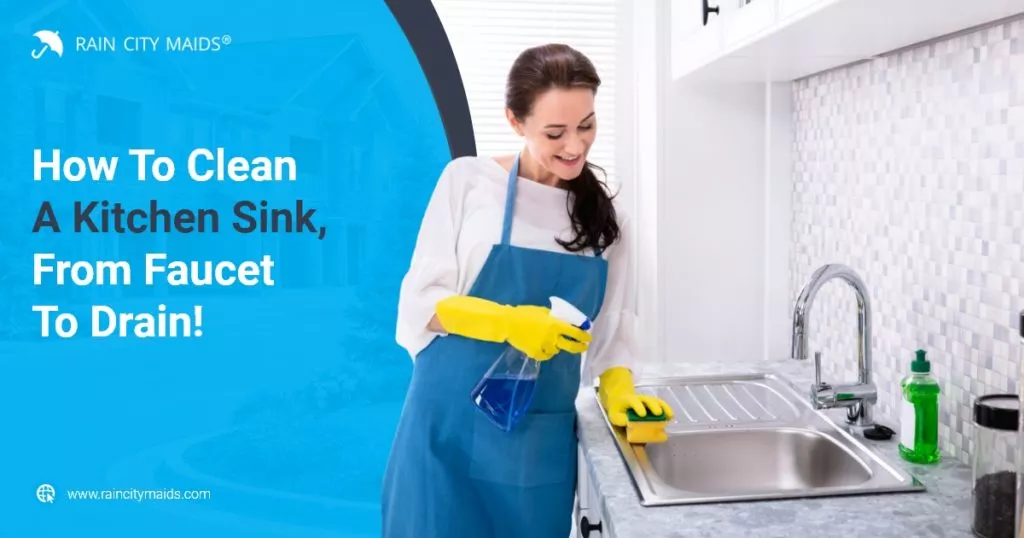Sink cleaning is an essential task inside the kitchen. Have you detected foul smells as you walk by your kitchen sink? You might be cleaning it less than you should be! Keep reading, and you'll learn how you can clean the kitchen sink the right way!
How often should I clean the kitchen sink?
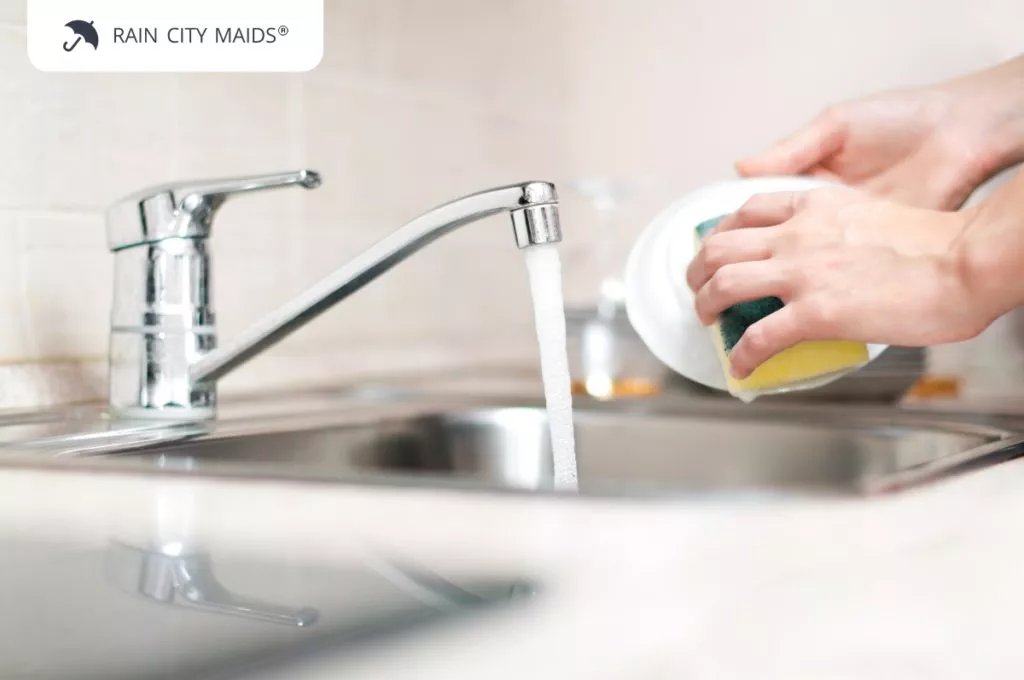
Your kitchen sink is far from clean. On the contrary, it is one of the grimiest places inside your kitchen! It's no wonder: moisture, food particles, and hard-to-reach spots make it the perfect environment for foodborne bacteria and other germs.
However, with all the water and soap running daily through the sink, people tend to overlook this chore. That might need to change, though! You should clean the fixture each week, but also daily wiping and maintenance are required to keep germs at bay.
Here we tell you how to clean your kitchen sink!
What can I use to clean my sink?
You can clean your kitchen sink using warm soapy water and a soft sponge or cloth. However, if the fixture has stuck grime or tough stains, you might need to bring the full cleaning arsenal.
Rain City Maids trust eco-friendly cleaning products to carry out all their services! You can also use green cleaners like baking soda and vinegar to clean your kitchen.
To clean your kitchen sink, you need:
- Dish soap and water
- Non-abrasive scrubber (soft sponge or microfiber cloth)
- Baking soda
- White vinegar
- Hydrogen peroxide (for removing stains on porcelain)
- Ice cubes (for the garbage disposal)
Step 1: Remove everything from the sink and rinse
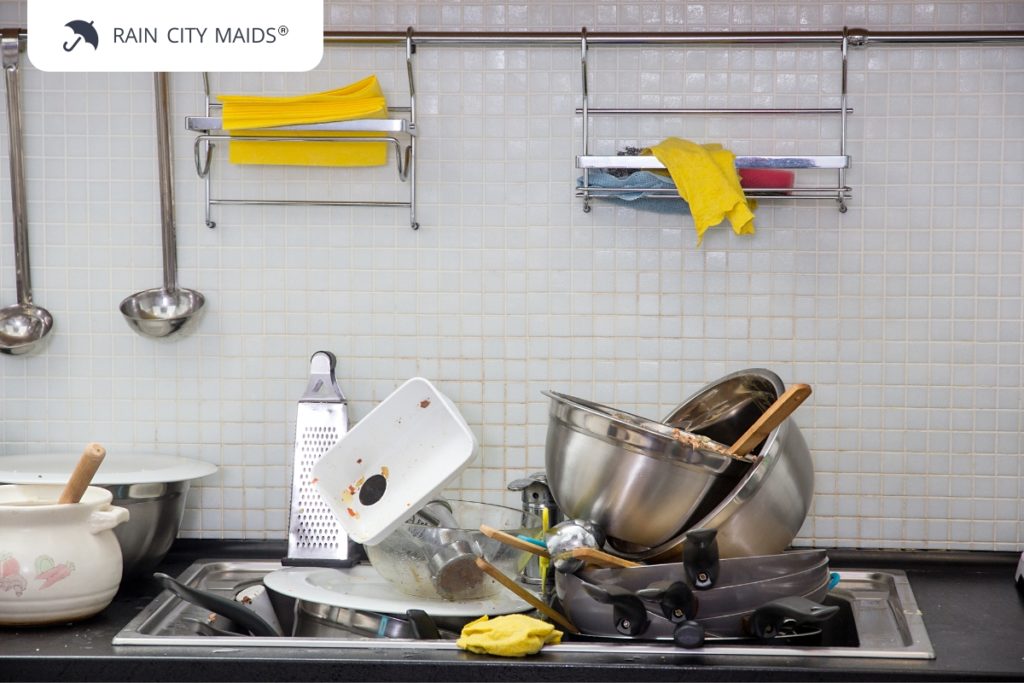
The fixture should be almost clean if you have been wiping it regularly. Otherwise, you need to remove everything first. If there are any dishes, utensils, and dish racks, take them out of the sink.
You might also find visible stains and even food waste. Wipe loose residue and crumbs using paper towels. Then, give your entire sink a rinse with running water before moving on to the next step.
Step 2: Clean the sink basin
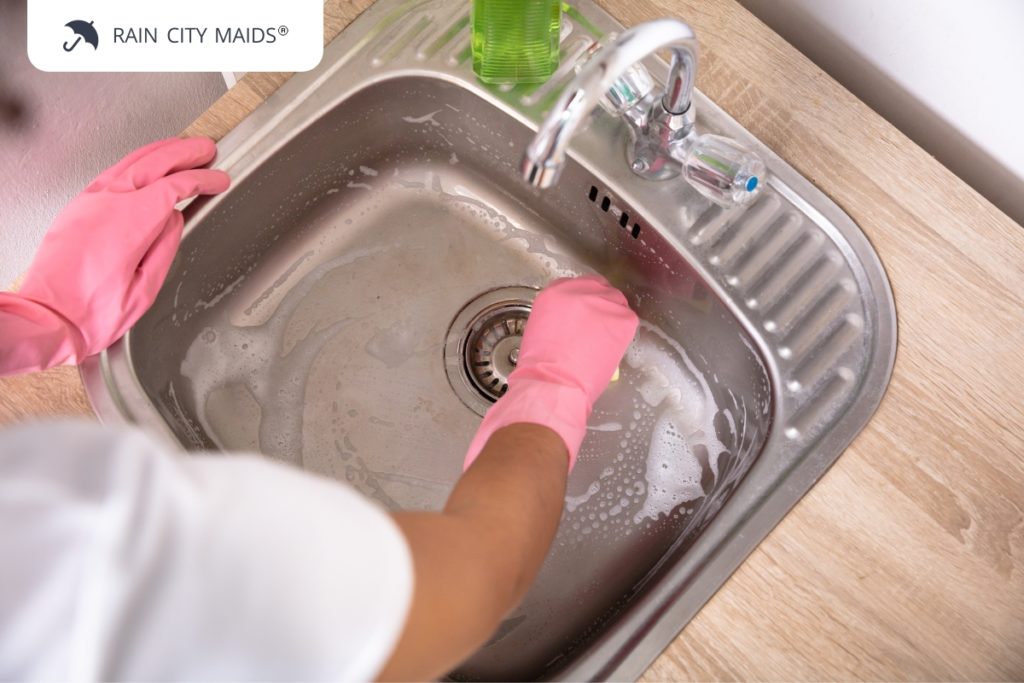
The best way to clean a kitchen sink is with mild dish soap and water. Contrary to other harsh cleaners, soapy water is safe for all kitchen sinks, including fragile or reactive materials like granite.
Wash the sink using warm soapy water and a soft sponge. Scrub gently throughout the entire sink basin, focusing on water spots and stains.
Step 3: Tackle the faucet, handles, and hard-to-reach spots
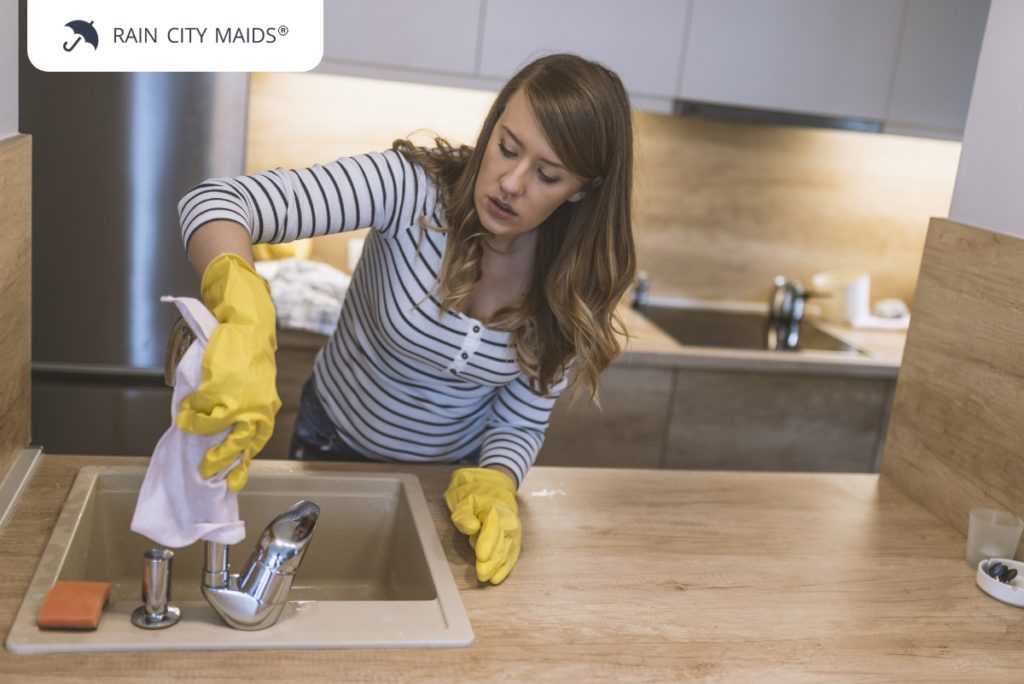
Scrub the faucet and handles with the sponge, then rinse them with a wet cloth. In most cases, wiping the faucet with a soft sponge and soapy water is enough to give it back its like-new appearance.
Use a soft-bristled toothbrush dipped in soapy water to scrub hard-to-reach spots in the handles and faucet. Also, scrub the crannies and nooks in the sink basin.
Also:
You can spray a white vinegar and water solution to remove water stains and grime in stainless steel.
Removing mineral buildup from the faucet
In the Seattle area, running water contains minerals that can build up in your faucet. Removing the mineral deposits won't take a contractor or expensive cleaning products—you can clean them using only white vinegar!
Once you finish cleaning your sink and drain, cover the faucet using a bag full of vinegar. Keep it there overnight (or several hours at least.) Then, scrub the deposits with a soft brush until it goes off!
Here is a quick example!
Step 4: Deep cleaning and sanitizing
It's tempting to scrub grime using an abrasive sponge or steel wool. However, most sinks won't take harsh scrubbing well, and you might end up scratching it!
Instead, scrub it with baking soda!
- Sprinkle the baking soda generously until it almost covers the entire sink surface.
- Then, scrub it gently with a wet sponge.
- Finally, rinse the baking soda with warm running water.
Most grime and stubborn stains will go off your kitchen sink with enough elbow grease. However, if you need extra cleaning power, there are some tricks:
- For stainless steel: Spray some vinegar directly on the grime and let it react for a few minutes before scrubbing.
- For porcelain sinks: Use hydrogen peroxide to remove tough stains. Add a few drops directly where the stains are and let it fizz for a few minutes. Continue scrubbing until the stain is gone.
- For other types of kitchen sink: Add dish soap to the sponge and continue scrubbing.
How do you sanitize a kitchen sink?
After washing your kitchen sink with soapy water and baking soda, many disease-causing germs are gone. However, to sanitize your sink, you'll need to apply a disinfectant solution safe for the type of material.
White vinegar is the green option and also safe for stainless steel and porcelain:
- Mix half vinegar and half water in a spraying bottle.
- Then, spray the vinegar solution and let it sit for a few minutes.
- Wash the vinegar down the drain.
Step 5: Clean the drain and garbage disposal
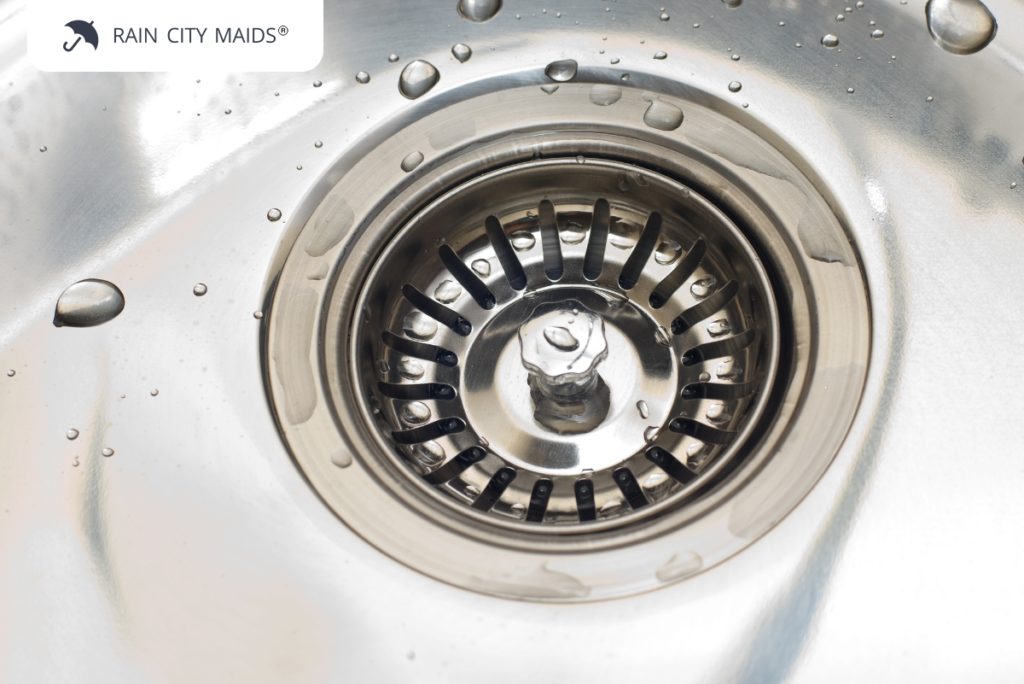
The place in your sink where grime can build up more easily is down the drain—to the point of clogging it!
You can clean the gunk down the pipes with baking soda, white vinegar, and hot water:
- Place a pot of water on the stovetop.
- While the water heats up, sprinkle half a cup of baking soda directly on the drain.
- Then, pour a cup of full-strength white vinegar down the drain and cover the drain hole.
- Leave the mix to fizz for a few minutes until the water finishes heating up.
- Pour the boiled water down carefully!
Note: If you have PVC pipes, let the water cool down a little before pouring it!
How to clean the garbage disposal
If you have a garbage disposal, it needs attention too! However, you should avoid harsh cleaners and hot water to prevent damages—also, they can splash out during the cleaning process.
Instead, clean the disposal using ice, salt, and a few lemon slices! The ice and salt will scrub the device's blades, and the lemon slices will help with the smell.
- Put ice cubes in your garbage disposal, a tablespoon of salt, and some lemon slices.
- Run cold tap water and the disposal for 30 seconds.
Prevent gunk in your garbage disposal:
Don't ditch greasy food residue down the disposal! Grease can easily clog your draining system, but it also takes its toll on the whole Seattle sewer system. Avoid overloading the device with greasy waste!
Need help cleaning the kitchen? Hire professional cleaners in Seattle
Do you want to keep your kitchen neat and clean? Rain City Maids is here for you! We treat your kitchen either in our One Time/ Deep Cleaning or Recurring Cleaning. In fact, we can clean your whole home!
Get your schedule with instant pricing at Professional House Cleaners in Kirkland.
Read More Cleaning Tips:
